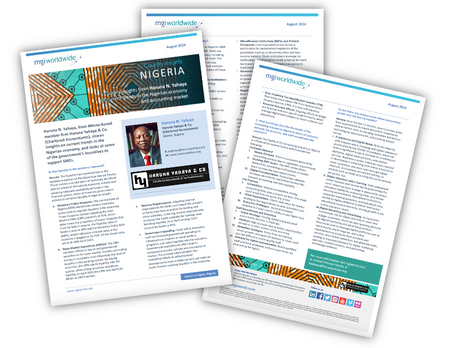Haruna Yahaya & Co. shares updates on Nigeria’s economy, SMEs, and areas of growth in latest Country Insight

Haruna N. Yahaya, from Minna-based member firm Haruna Yahaya & Co. (Chartered Accountants), shares insights on current trends in the Nigerian economy, looks at some of the government’s incentives to support SMEs, and considers some of the main areas of growth within the industry.
Q: Has liquidity in the economy improved?
Haruna: The liquidity has improved due to the laudable initiatives of President Bola Ahmed Tinubu. These involve a combination of monetary and fiscal policies aimed at stimulating economic activity and ensuring adequate availability of funds in the financial system. Some of these key government policies to enhance liquidity in Nigeria include:
- Monetary Policy Measures: The Central Bank of Nigeria (CBN) is implementing various monetary policy tools to regulate liquidity in the economy.
- Open Market Operations (OMOs): The CBN conducts OMOs to buy or sell government securities in the open market, thereby controlling money in circulation and influencing the level of liquidity in the banking system.
- Reserve Requirements: Adjusting reserve requirements for banks can impact the amount of funds they have available for lending and other activities. Lowering reserve requirements increases the funds available for lending, thus boosting liquidity.
- Government Spending: Fiscal policy measures, such as increased government spending on infrastructure projects or social welfare programs, can inject liquidity into the economy. Government expenditures often lead to increased economic activity and circulation of money.

Q: Has more been done to create SMEs?
Haruna: SMEs contribute significantly to Nigeria's GDP, accounting for 48% of the Country’s GDP. SMEs are involved in various sectors of the economy, including agriculture, manufacturing, services, and retail. The Nigerian government has implemented various initiatives and policies to support small and medium-sized enterprises (SMEs) in the country. Some of these measures include:
- Establishment of Development Finance Institutions offering loans, grants, and capacity-building programs tailored to the needs of SMEs.
- Credit Guarantee Schemes facilitating SMEs' access to finance.
- Tax Incentives and Concessions given to SMEs to reduce their tax burden and encourage entrepreneurship.
- SME Access to Markets through initiatives such as trade fairs, exhibitions, and market linkage programs.
- Entrepreneurship Development Programs including workshops, and training sessions to equip SME owners with the skills and knowledge needed to start, manage, and grow their businesses successfully.
- Infrastructure Development projects, such as roads, electricity, and telecommunications, to improve the business environment for SMEs.
- Access to Technology and Innovation Support by providing access to technology hubs, incubators, and innovation centres.
- Policy Reforms and Regulatory Simplification affecting SMEs create a more conducive business environment
Q: Are there any services areas where demand has grown over the last 12 months?
Haruna: Over the last 12 months, several service areas have experienced increased demand in response to various factors such as changing consumer behaviours, technological advancements, and evolving market trends.
- E-commerce and Digital Retail: With the ongoing shift towards online shopping and digital commerce accelerated by the COVID-19 pandemic, there has been a significant surge in demand for e-commerce platforms, digital retail solutions, and related services. Businesses across industries have invested in developing or enhancing their online presence to reach customers and drive sales through digital channels. Accountants are not left behind, as services such as cloud accounting for online services are on the rise.
- Online Education and E-learning: With widespread school closures and remote learning becoming the norm, there has been a surge in demand for online education platforms, e-learning tools, and virtual learning environments. Educational institutions, corporate training providers, and individuals have turned to digital platforms to deliver and access educational content remotely, driving growth in the online education sector.
- Digital Marketing and Advertising: As businesses increasingly rely on digital channels to reach and engage customers, there has been growing demand for digital marketing and advertising services. Businesses seek to leverage digital platforms such as social media, search engines, and online marketplaces to promote their products and services, drive brand awareness, and generate leads, leading to increased demand for digital marketing agencies, content creators, and advertising technology solutions.
Click to download the full Country Insight with lots of additional updates.

Thank you
A big thank you to Haruna for taking time out to share his valuable thoughts and insights.
#TogetherWeAreStonger

About our member firm
Find out more about Haruna Yahaya & Co. (Chartered Accountants) by visiting its profile page or website.
MGI Worldwide is a top 20 ranked global accounting network and association with over 8,000 professionals, accountants and tax experts in some 400 locations in almost 100 countries around the world.
